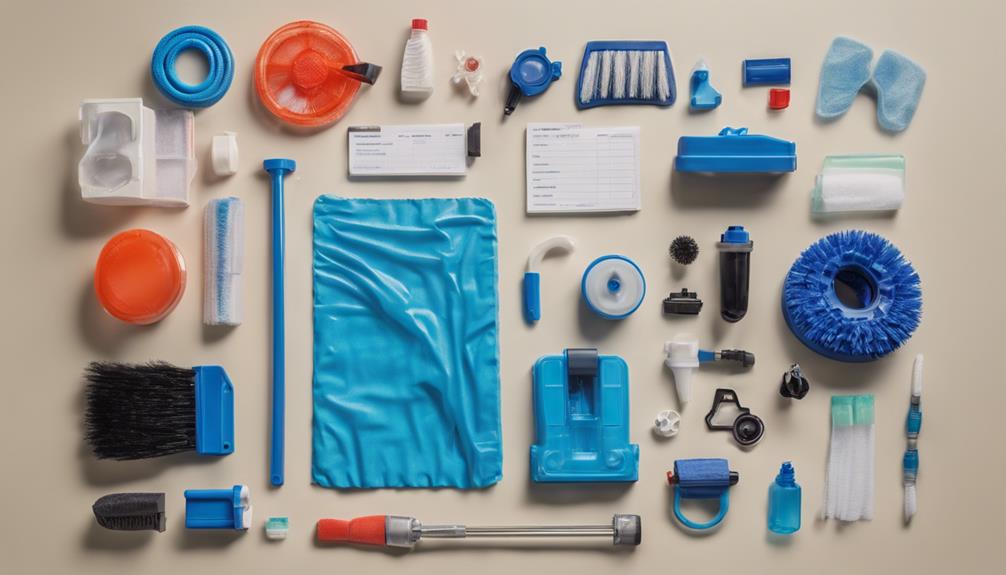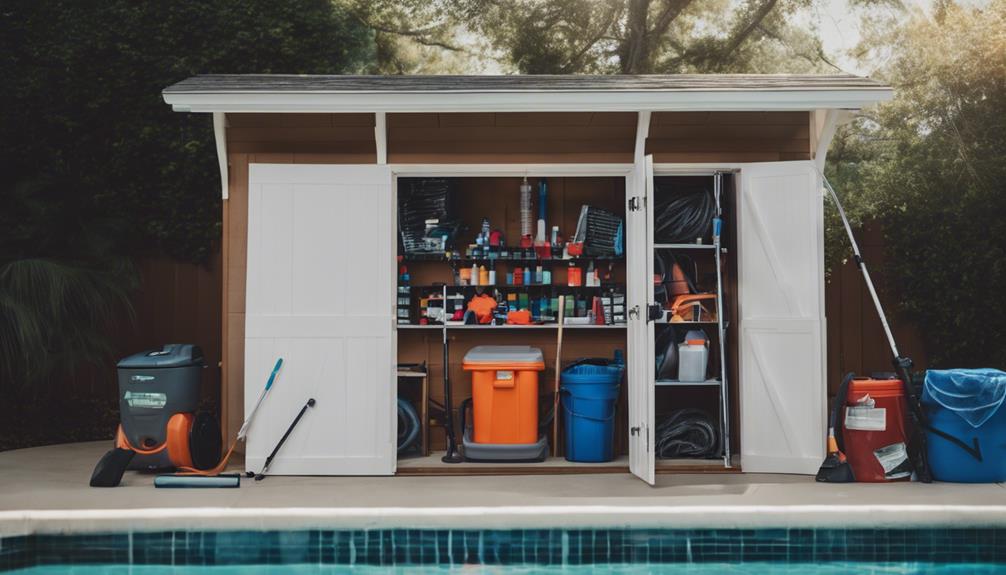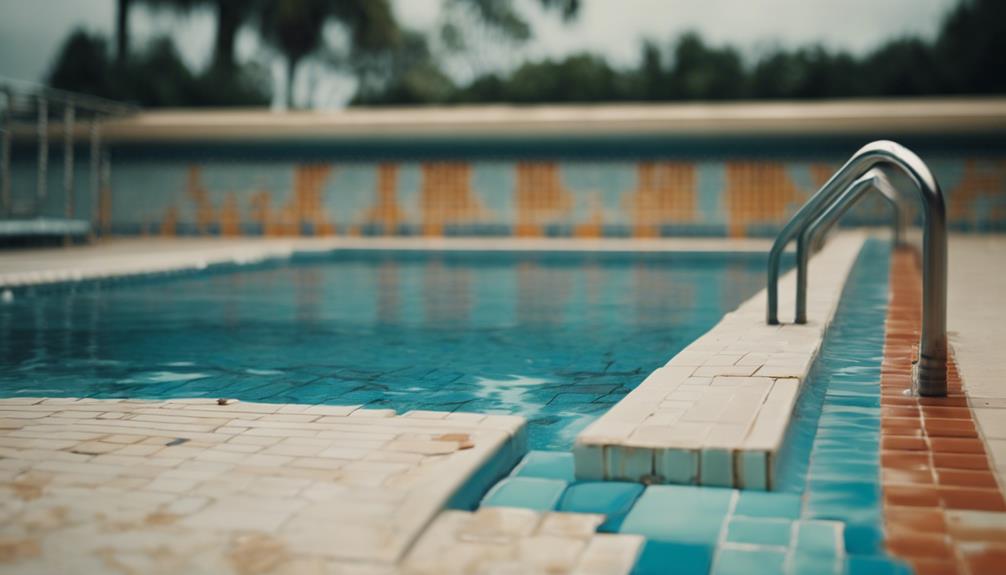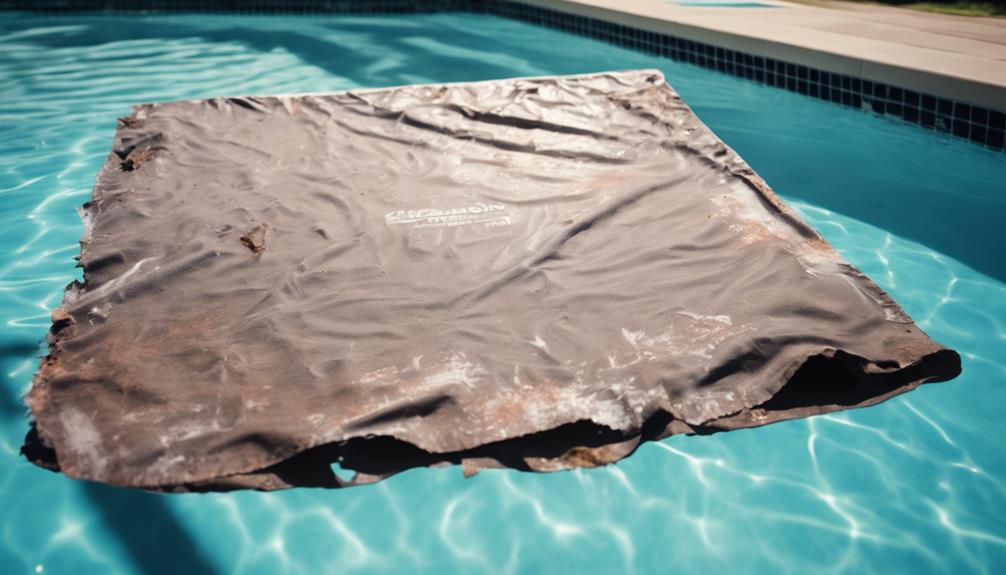To maintain a clean and balanced pool, make sure to have necessary pool testing kits, including water analysis and key chemical tests. Stock up on pH balancer, chlorine tablets, and alkalinity stabilizer for best water quality. Don't forget pool cleaning supplies like a pool rod, vacuum head, leaf rake, brush, and leaf scoop to keep your pool spotless. Each item plays an essential role in maintaining your pool's cleanliness and safety. Explore the detailed checklist to discover more ways to optimize your pool is always swim-ready.
Key Takeaways
- Essential pool testing kits ensure proper chemical balance and prevent issues like algae growth.
- Must-have pool chemicals include pH balancer, chlorine tablets, and alkalinity balance for water sanitation.
- Key pool cleaning supplies like a pool rod, vacuum head, leaf rake, brush, and leaf scoop are essential for debris removal.
- Regular testing benefits include maintaining safe swimming conditions and addressing imbalances promptly.
- Optimize pool maintenance with a detailed checklist to extend pool lifespan and minimize costly repairs.
Essential Pool Testing Kits
Pool maintenance begins with the utilization of essential pool testing kits to maintain water quality and chemical balance. These kits include pool water analysis kits, calcium hardness test strips, chlorine indicator strips, pH balance testing tools, and tests for alkalinity and calcium levels.
Regularly testing your pool water guarantees that the chemical levels are within the recommended range, promoting a safe and enjoyable swimming environment. By monitoring these key parameters, pool owners can address any imbalances promptly, preventing potential issues such as algae growth, equipment damage, or skin irritation.
Investing in reliable pool testing kits is vital for maintaining a clean and well-balanced pool, ultimately extending its lifespan and minimizing the need for costly repairs.
Must-Have Pool Chemicals
Necessary for maintaining proper water chemistry and sanitation in your pool, the must-have pool chemicals play an important role in securing a safe and enjoyable swimming experience. These essential chemicals help balance pH levels, prevent algae growth, and disinfect the water. Here are some key pool chemicals every pool owner should have:
| Pool Chemical | Function | Importance |
|---|---|---|
| pH Balancer | Regulates acidity levels | Secures swimmer comfort |
| Chlorine Tablets | Sanitizes water | Kills bacteria and viruses |
| Alkalinity Balance | Stabilizes pH levels | Prevents pH fluctuations |
Key Pool Cleaning Supplies

When maintaining your pool, essential cleaning supplies such as a pool rod, vacuum head or hose, leaf rake, brush, and leaf scoop or skimmer are vital tools to guarantee a clean and inviting swimming environment.
A pool rod allows you to reach all areas of the pool easily, while a vacuum head or hose helps in removing debris from the pool floor.
The leaf rake is perfect for skimming leaves and larger debris off the water's surface, and a brush is crucial for scrubbing the pool walls and floor.
Additionally, a leaf scoop or skimmer aids in collecting floating debris.
Having these key pool cleaning supplies on hand makes sure that your pool stays clean and well-maintained for enjoyable swimming experiences.
Frequently Asked Questions
Can I Use Regular Household Cleaners to Clean My Pool?
Using regular household cleaners to clean your pool is not recommended. Pool surfaces require specific chemicals to maintain balance and prevent damage. Using improper cleaners can affect water chemistry, damage pool surfaces, and harm swimmers.
How Often Should I Shock My Pool?
Shocking your pool should be done regularly, typically every 1-2 weeks during peak season. Factors like usage, weather conditions, and water quality affect the frequency. Regular shock treatments help eliminate contaminants, maintain water clarity, and guarantee proper sanitation levels.
Is It Necessary to Test Pool Water After Heavy Rain?
After heavy rain, testing pool water is essential to maintain water balance. Rain can dilute chemicals and introduce contaminants. Proper testing guarantees safety and clarity for swimmers. Don't underestimate the impact of rain on your pool's chemistry.
Can I Use Pool Chemicals Interchangeably?
Interchanging pool chemicals can lead to imbalanced water chemistry, affecting swimmers' health and pool equipment. It is essential to use the appropriate chemicals for their designated purposes to maintain a safe and properly functioning pool environment.
What's the Best Way to Store Pool Chemicals Safely?
When storing pool chemicals, remember to SEGREGATE – keep them in a cool, dry place away from direct sunlight, moisture, and heat sources. Store in their original containers, tightly sealed, and away from each other to prevent reactions.
Conclusion
In the intricate dance of pool maintenance, the tools and supplies you choose are the guardians of your aquatic sanctuary.
Like a symphony conductor directing a harmonious performance, the ultimate pool maintenance supply checklist guarantees that your pool remains a sparkling oasis of tranquility and enjoyment.
From testing kits to chemicals and cleaning supplies, each component plays an essential role in orchestrating a symphony of pristine waters.
Embrace the checklist, and let your pool sing with clarity and energy.










